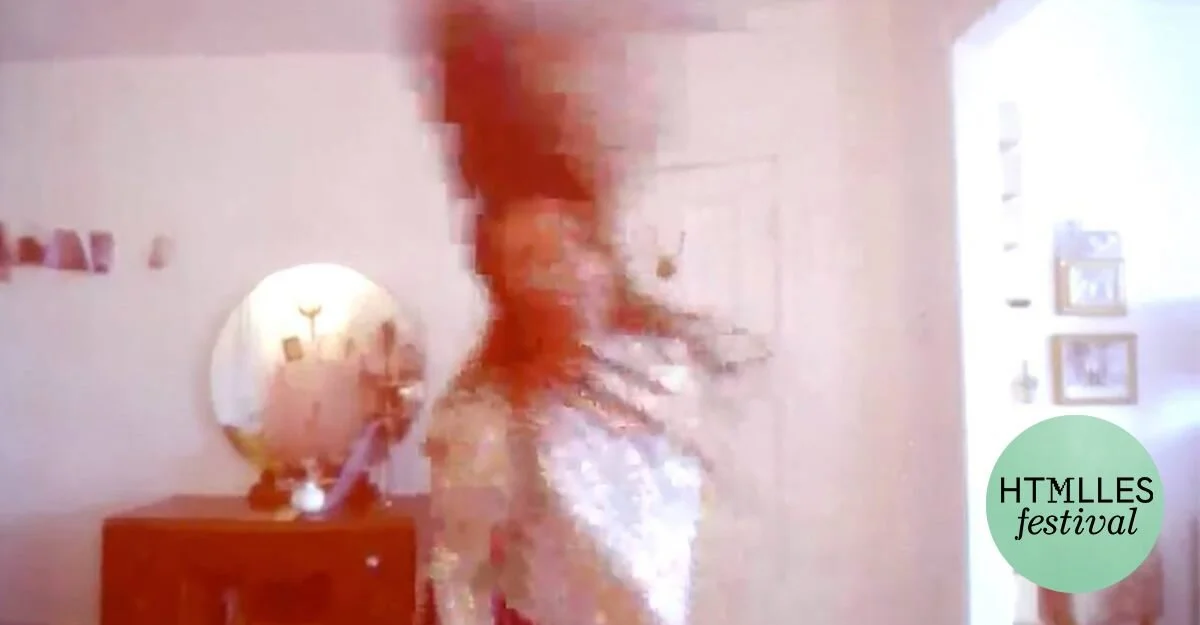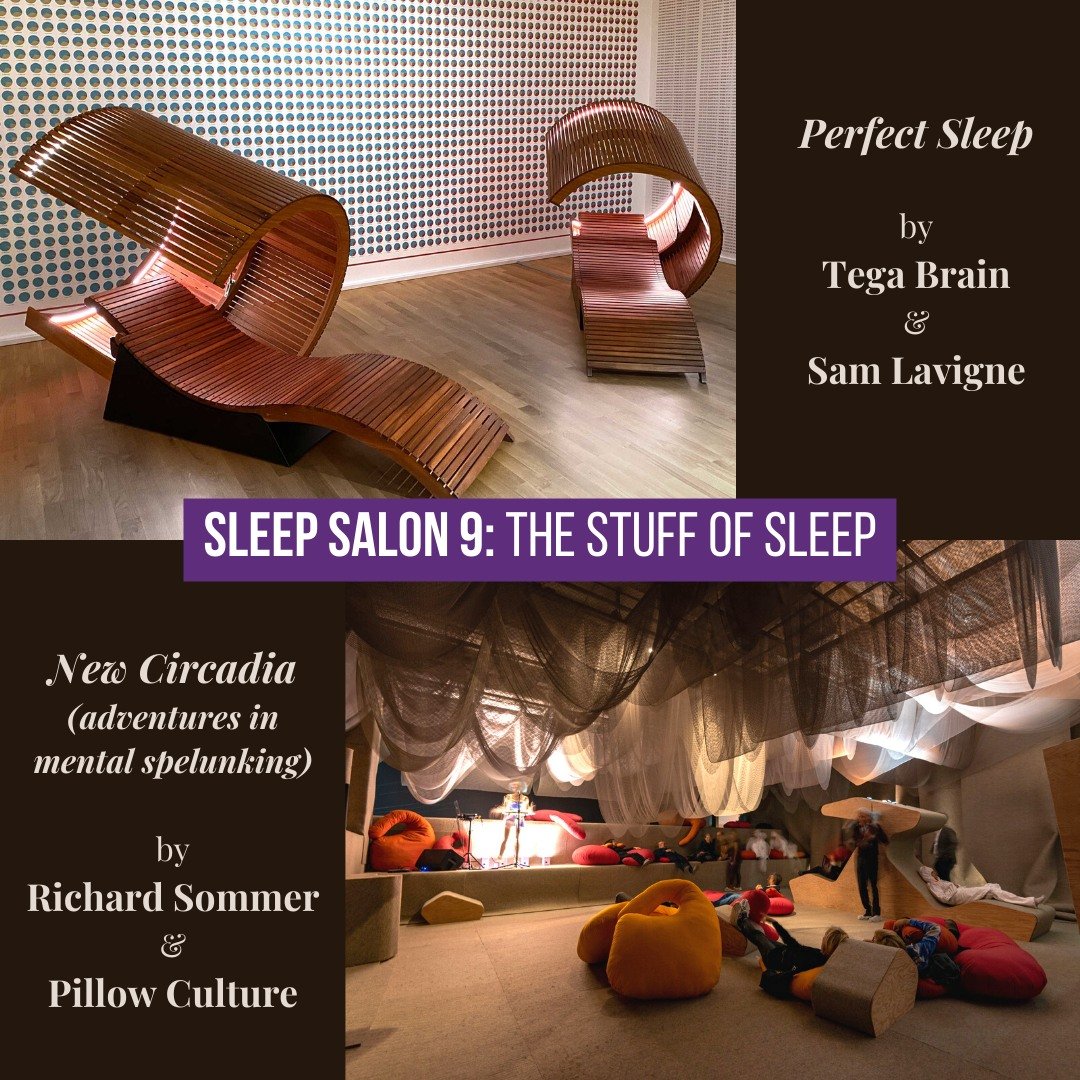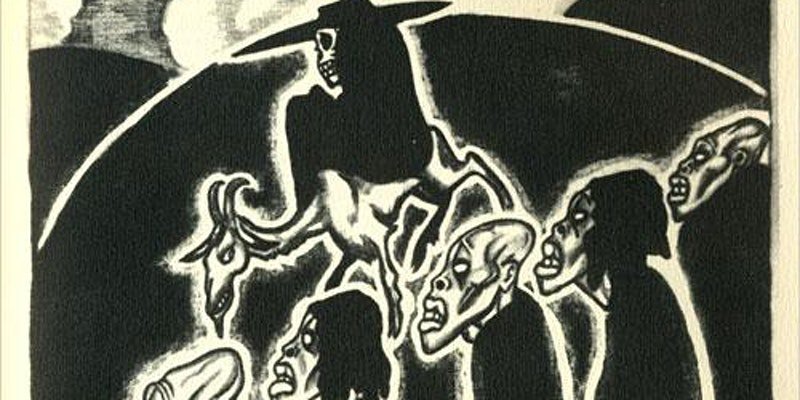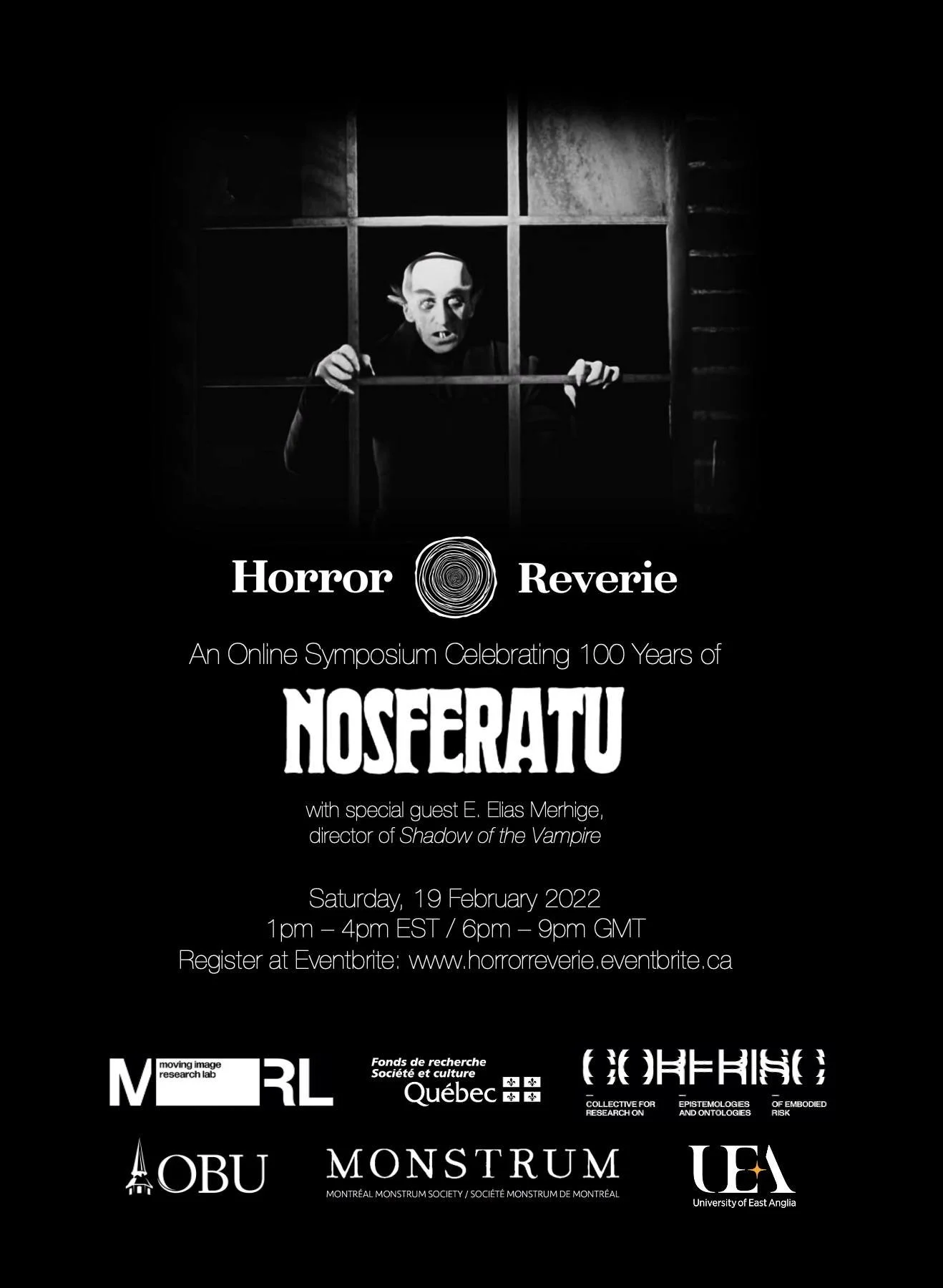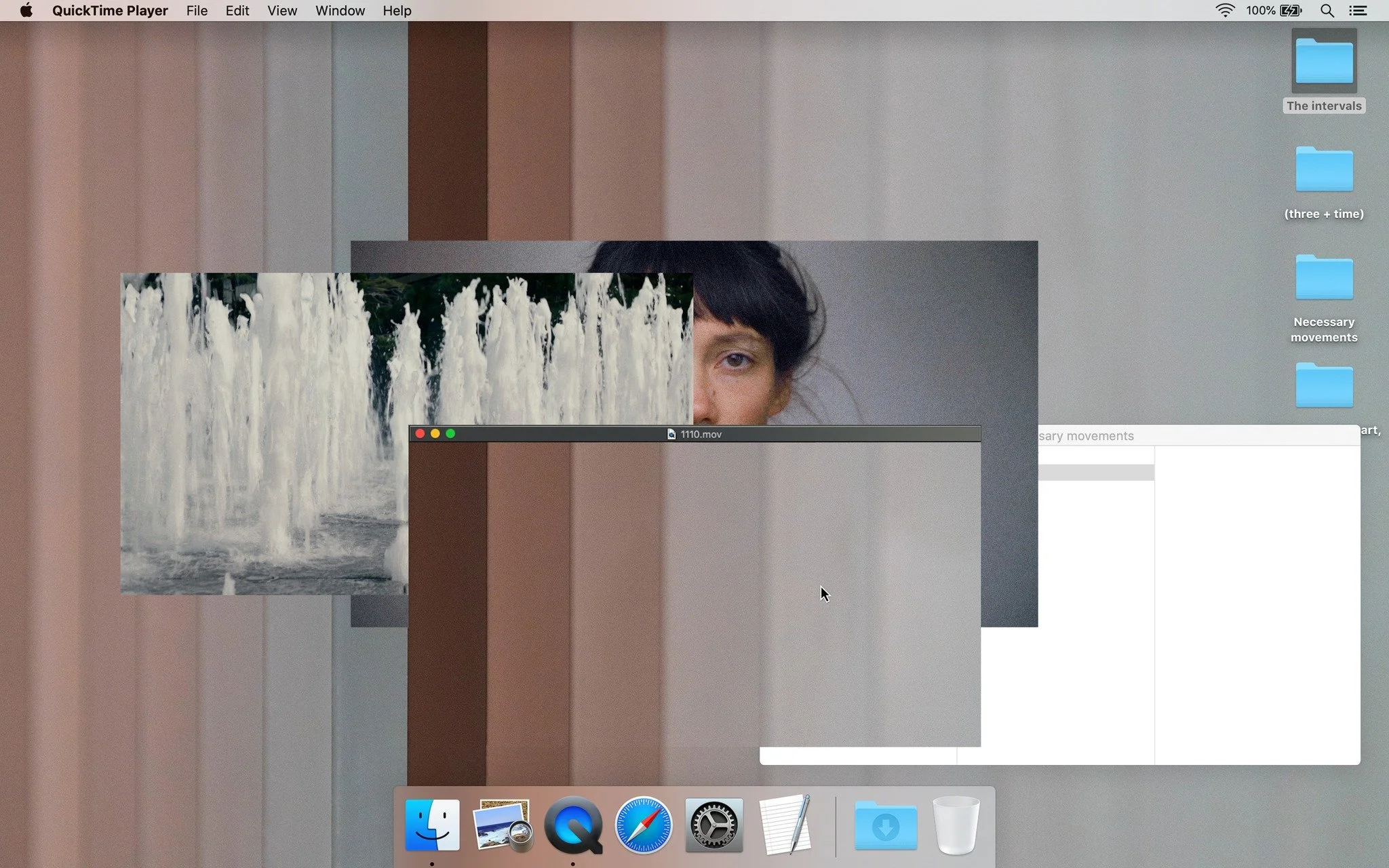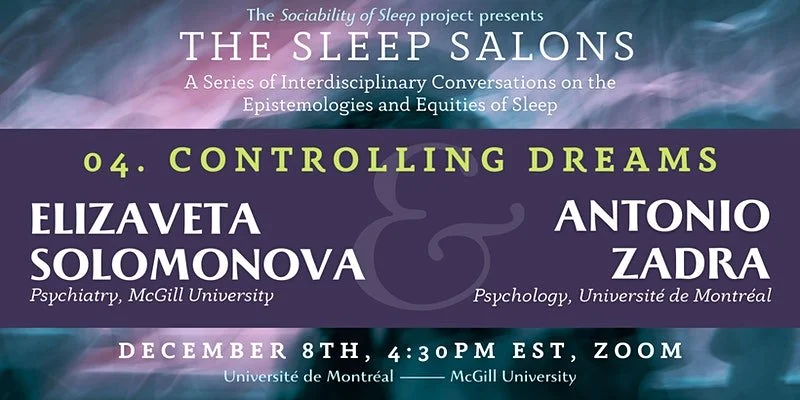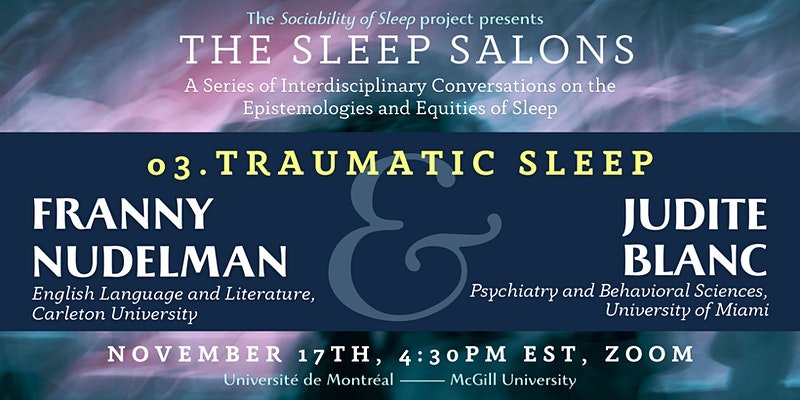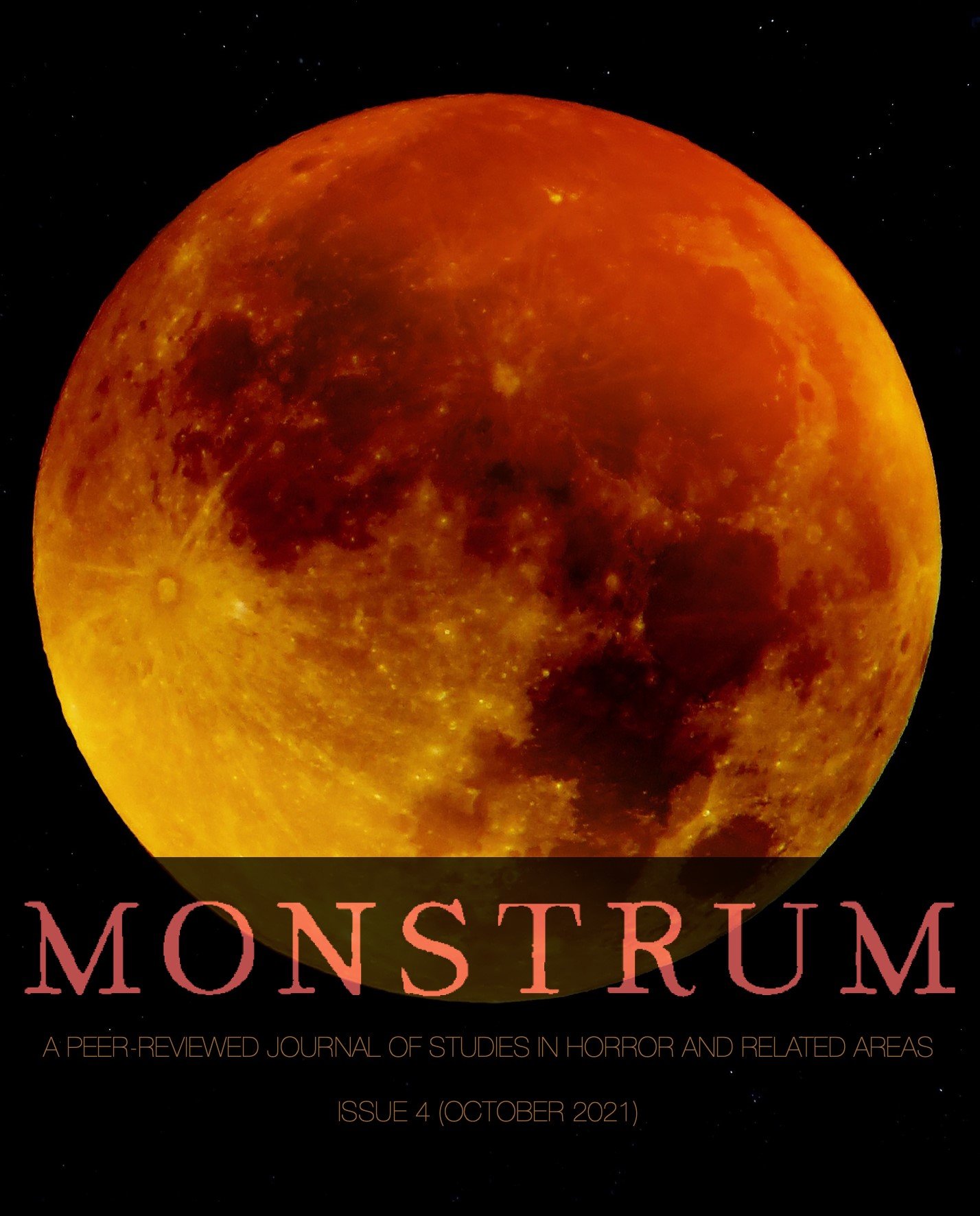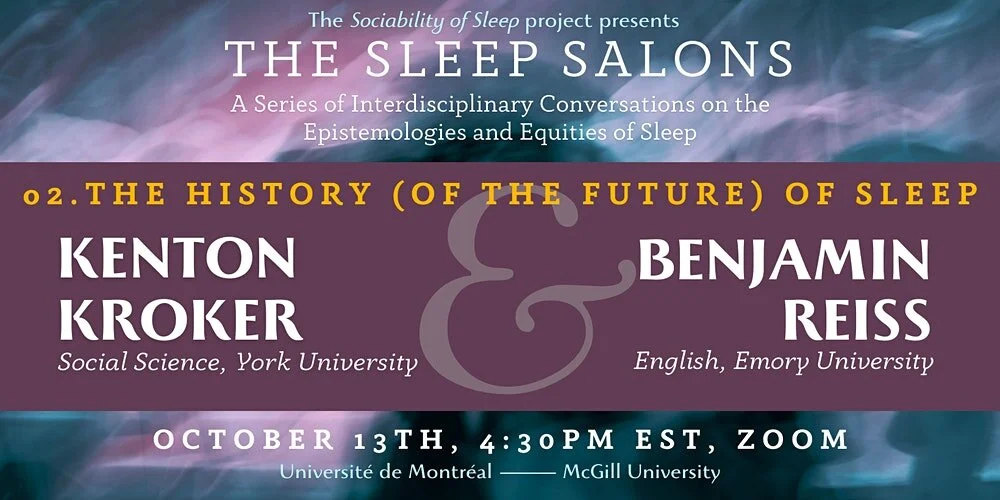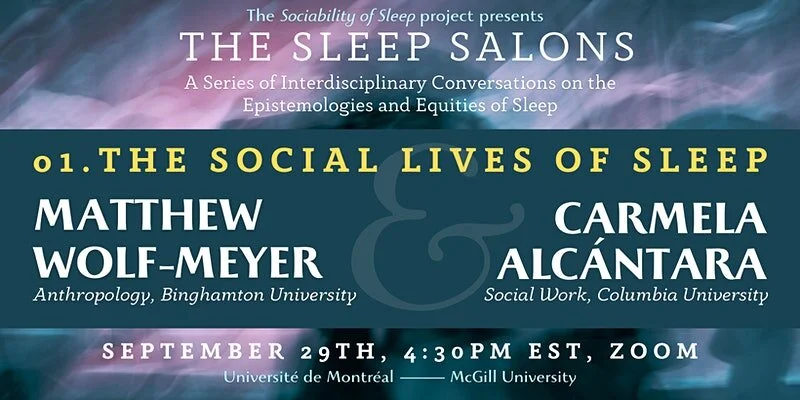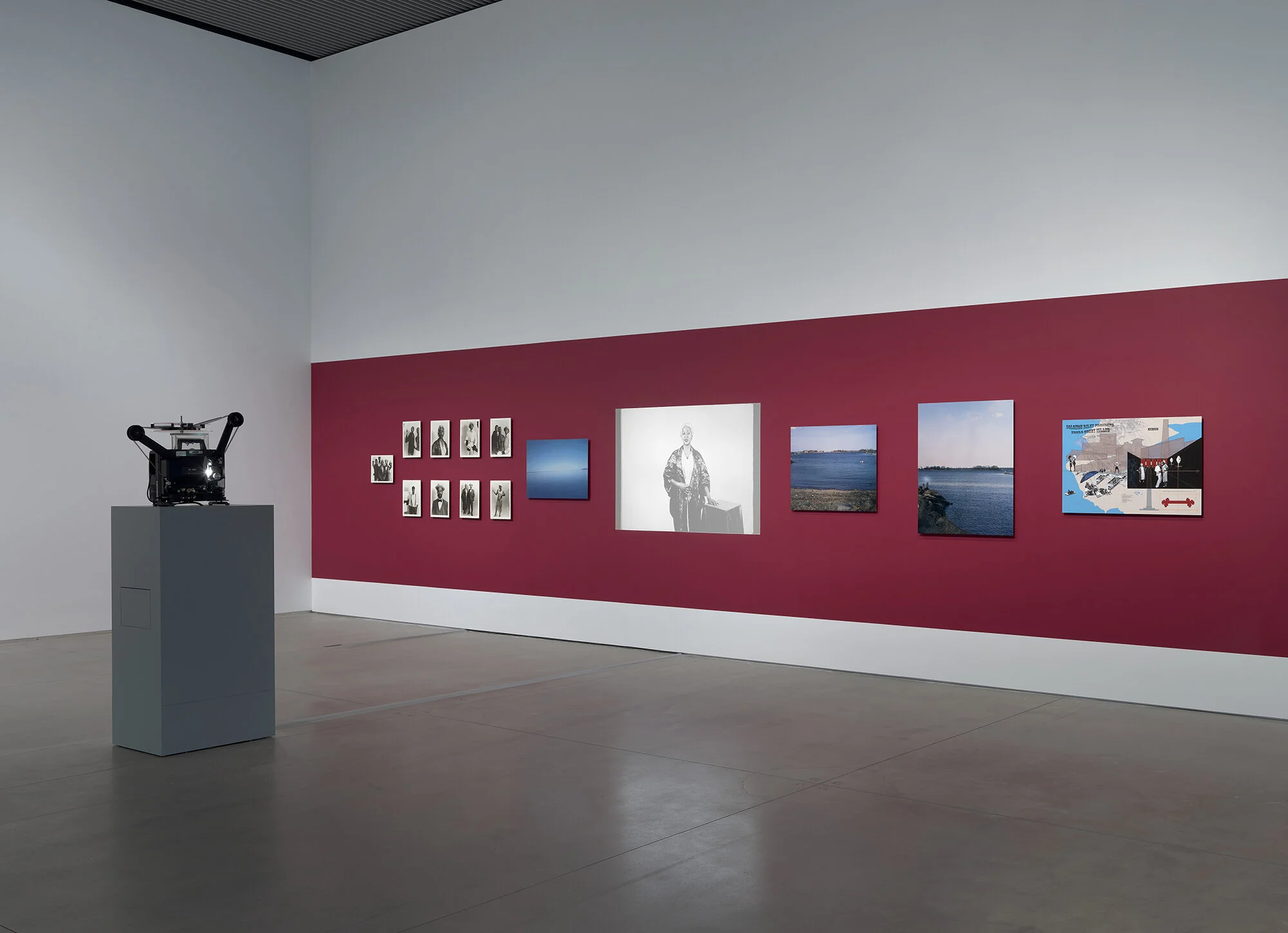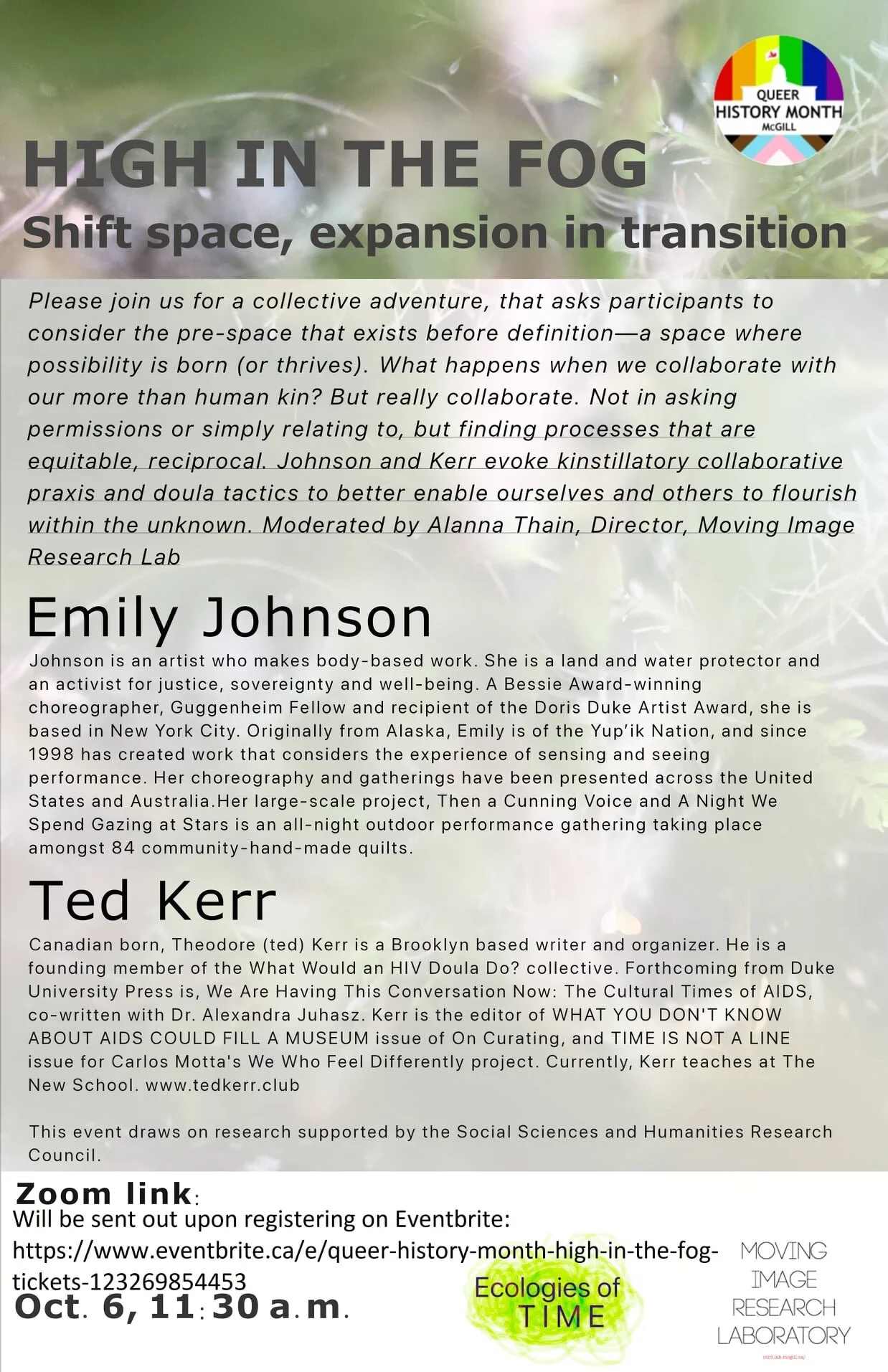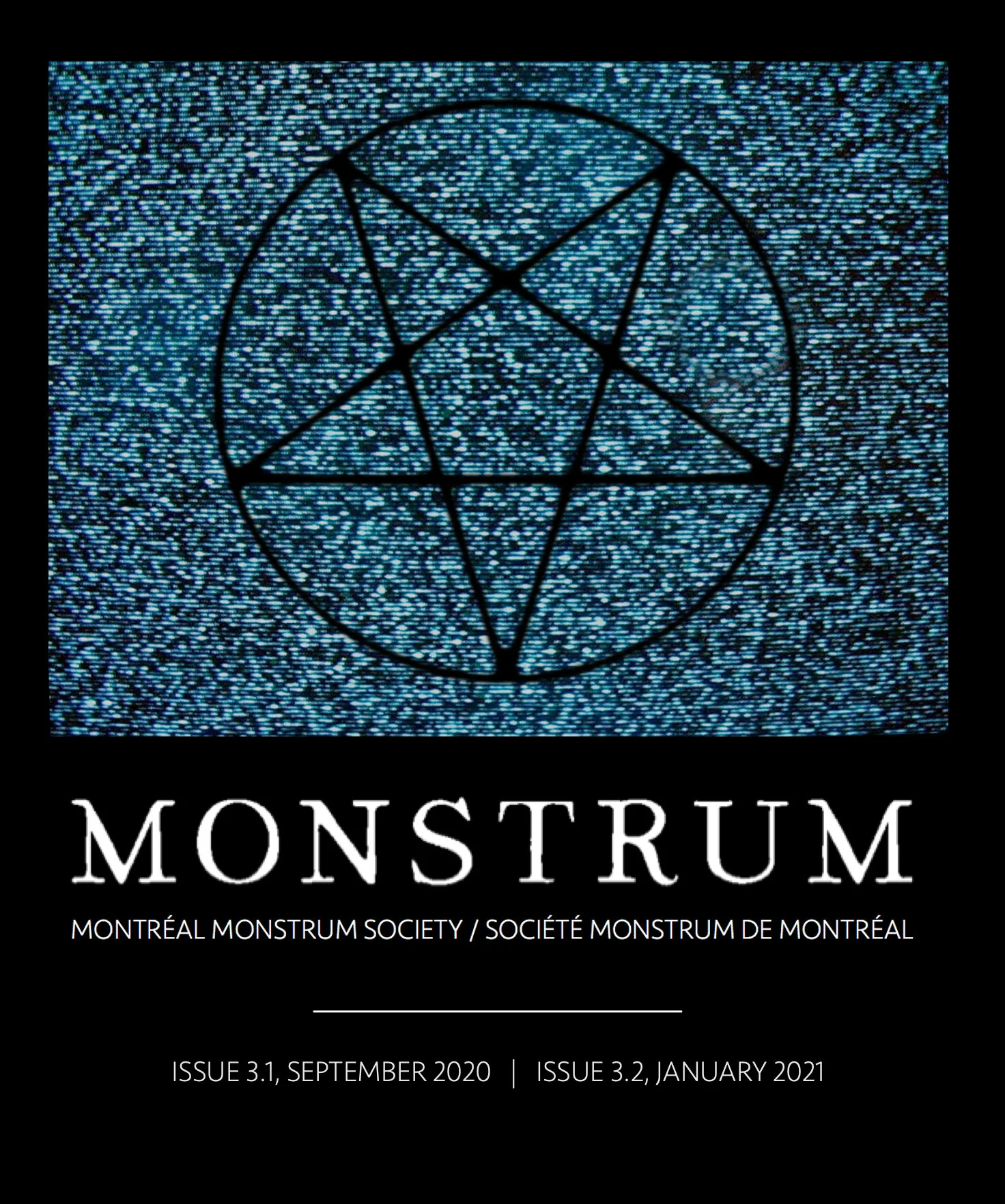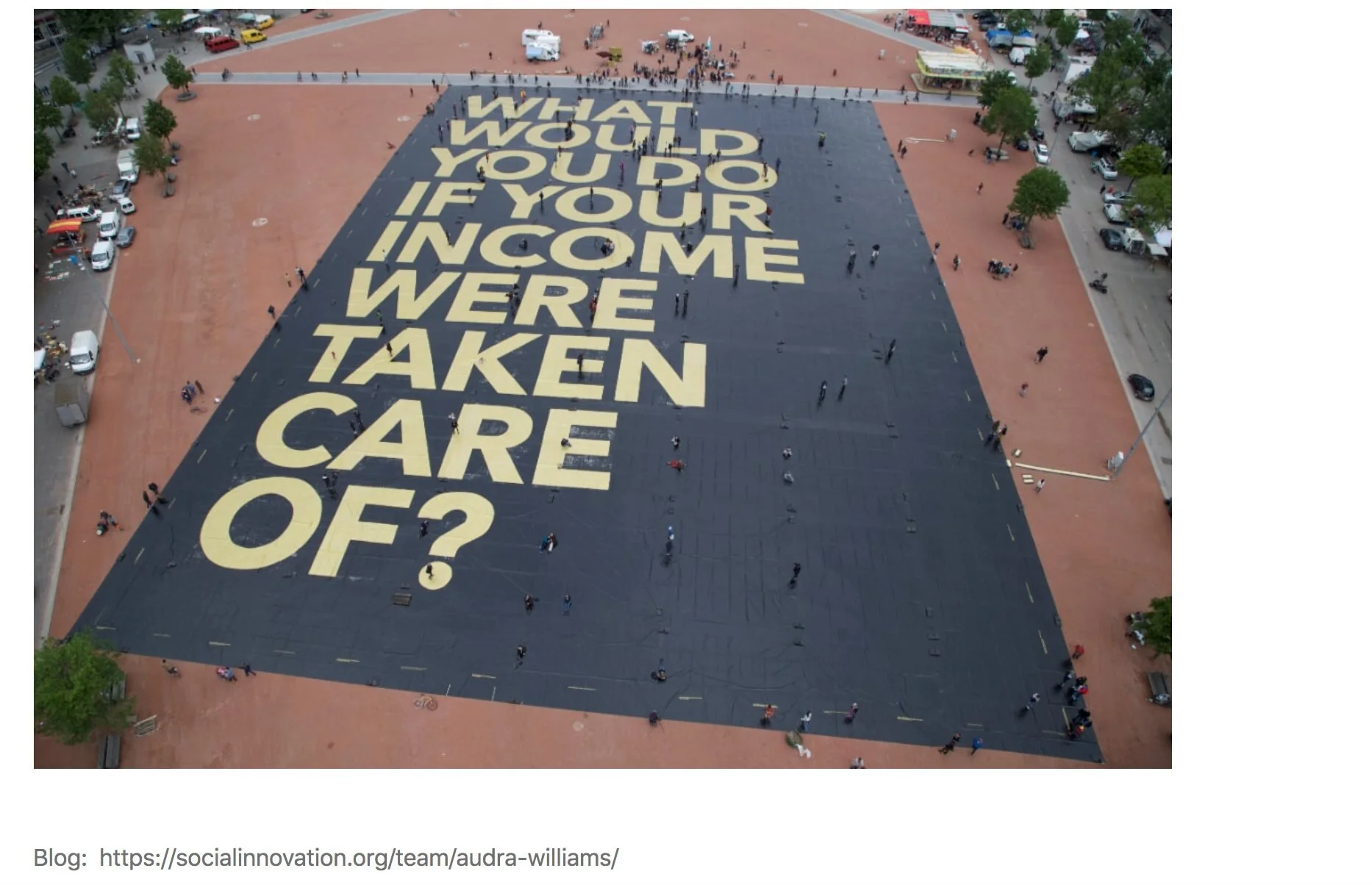Upcoming

HTMlles | Netflesh: Workshop and Roundtable
Presented by the Moving Image Research Lab (McGill) as part of the HTMlles festival, this workshop and roundtable center around questions about How art practices can give us survival tools for enduring zoomlife? How can digital art and performance practices expand the threshold between offline and online living in a time of crisis and connection into a more breathable space? In part one, four artists—Olivia McGilchrist, Ivetta Sunyoung Kang, Emilie Morin and Nadège Grebmeier Forget--will activate warm-ups for online bodies in a participatory activity; in part two, the artists in conversation will Professor Alanna Thain (Moving Image Research Lab, McGill) and other participants will discuss what happens when you work the transition to Netflesh’s sensitive skin.
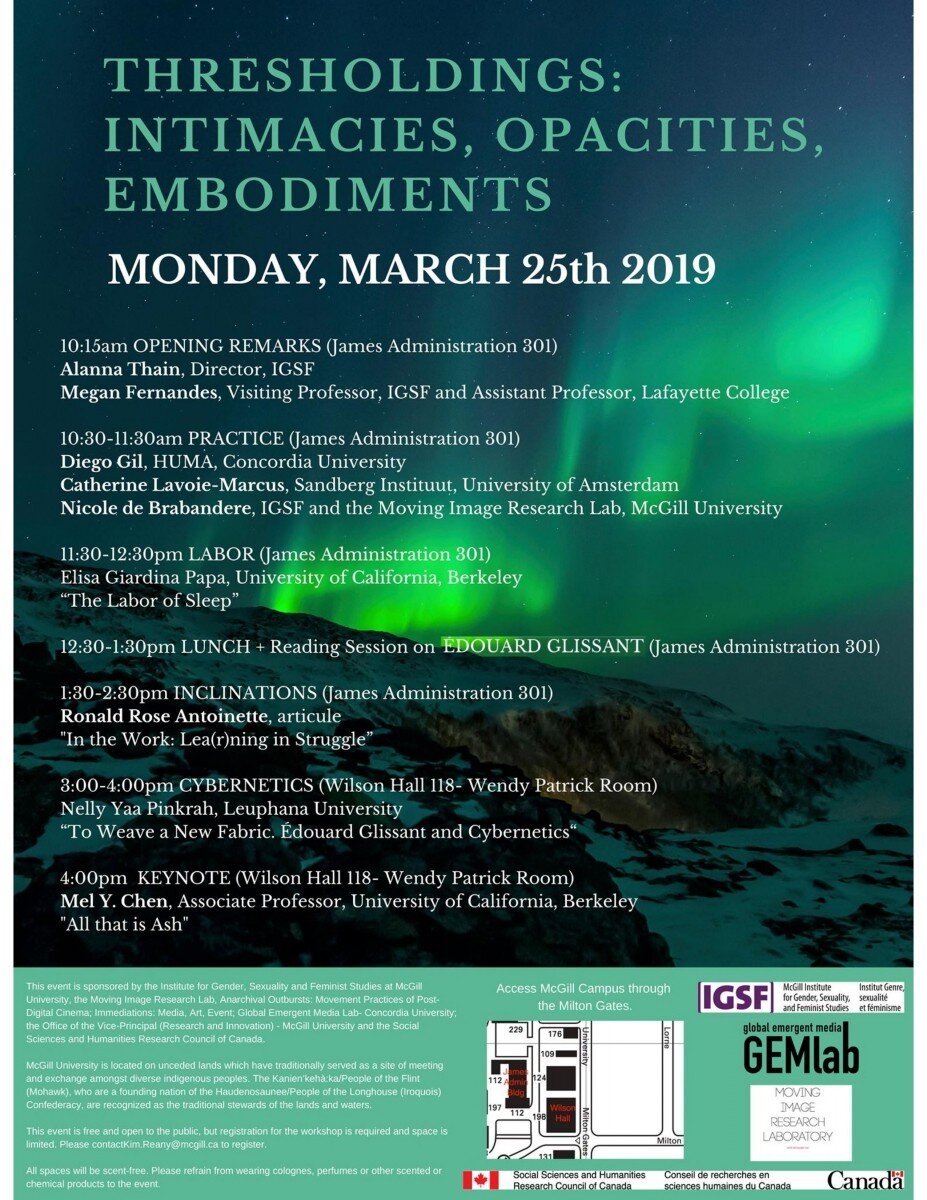
Thresholdings: Intimacies, Opacities, & Embodiments
This day-long workshop will move across practices and disciplines to explore the intersections of intimacy and liminality. What means are available to expand experiences of alterity or otherness, as in the surrender on the verge of sleep? How can such intimacies provide alternatives to attempts to make such experiences fully possessive, knowable, or extractable? The day will open with a series of participatory practice propositions, from somatics, choreography and drawing, before moving into a series of talks from artists and researchers, a reading session on Edouard Glissant’s work on “opacity”, and finally a keynote from Mel Y. Chen (Animacies) entitled “All that is Ash”.
SCHEDULE:
Thresholdings: Intimacies, Opacities, Embodiments
James Administration Room 301, McGill University
10:00am: Welcome
10:15am Opening Remarks by Alanna Thain, Director IGSF and the Moving Image Research Lab, McGill University and Megan Fernandes, Visiting Professor, IGSF, Assistant Professor, Lafayette College
10:30-11:30 PRACTICE
Diego Gil, HUMA, Concordia University
Catherine Lavoie-Marcus, Sandberg Instituut, University of Amsterdam
Nicole de Brabandere, IGSF and the Moving Image Research Lab, McGill University
11:30-12:30 LABOR
Elisa Giardina Papa, University of California, Berkeley
“The Labor of Sleep”
12:30-1:30 Lunch + reading session on Édouard Glissant “For Opacity”
1:30-2:30 INCLINATIONS
Ronald Rose Antoinette, articule
“In the Work: Lea(r)ning in Struggle”
3:00-4:00 CYBERNETICS
Nelly Yaa Pinkrah, Leuphana University
“To Weave a New Fabric. Édouard Glissant and Cybernetics“
4:00pm KEYNOTE
Mel Y. Chen, University of California, Berkeley
“All That is Ash”
This event is sponsored by the Institute for Gender, Sexuality and Feminist Studies at McGill University, the Moving Image Research Lab, Anarchival Outbursts: Movement Practices of Post- Digital Cinema; Immediations: Media, Art, Event; Global Emergent Media Lab- Concordia University; the Office of the Vice-Principal (Research and Innovation) – McGill University and the Social Sciences and Humanities Research Council of Canada.
McGill University is located on unceded lands which have traditionally served as a site of meeting and exchange amongst diverse indigenous peoples. The Kanien’kehà:ka/People of the Flint (Mohawk), who are a founding nation of the Haudenosaunee/People of the Longhouse (Iroquois) Confederacy, are recognized as the traditional stewards of the lands and waters.
Both locations are accessible. All spaces will be scent-free. Please refrain from wearing colognes, perfumes or other scented or chemical products to the event.
Access McGill Campus through the Milton Gates. Wilson Hall is located at 3506 Rue University, and the James Administration building is located inside campus, just to the north of the Milton Gates.
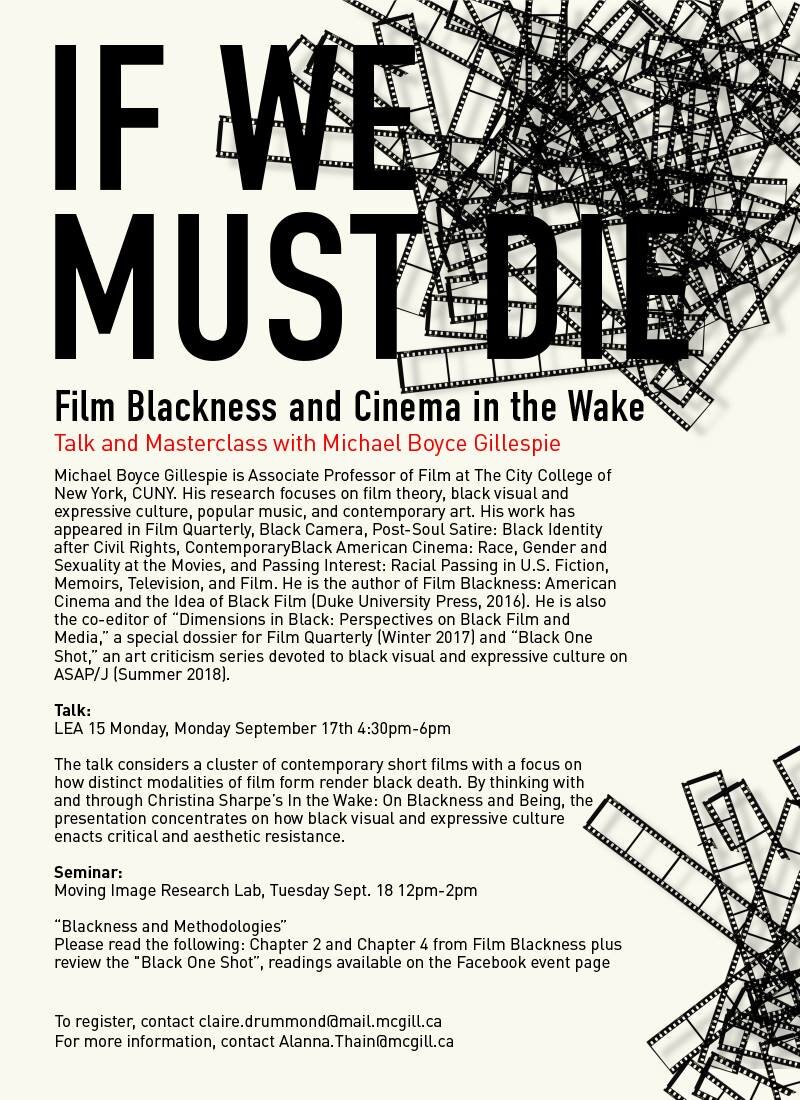
If We Must Die: Film Blackness and Cinema in the Wake
Lecture and Masterclass with CUNY Professor Michael Boyce Gillespie. The talk considers a cluster of contemporary short films with a focus on how distinct modalities of film form render black death. By thinking with and through Christina Sharpe’s In the Wake: On Blackness and Being, the presentation concentrates on how black visual and expressive culture enacts critical and aesthetic resistance.
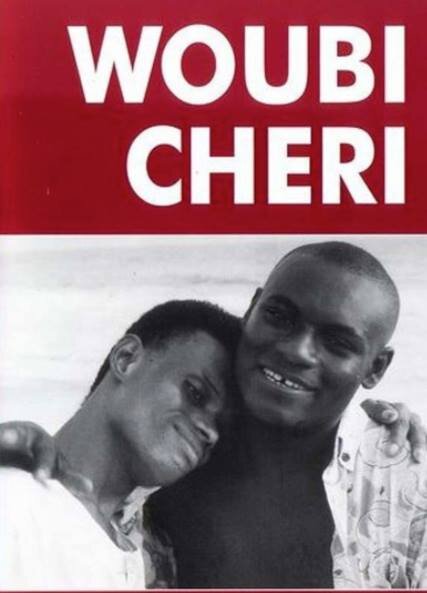
Making Scenes: WOUBI CHERI (1998) with Ellise Barbara
The first film in the "Making Scenes" screening series, hosted and with a post-film discussion by Ellise Barbara. This documentary from 1998 explores perspectives on gender variance and diversity outside of the westernized radical norm. As California Newsreel describes this: "Woubi Chéri is the first film to give African homosexuals a chance to describe their world in their own words. Often funny, sometimes ribald, but always real, this documentary introduces us to gender pioneers demanding their right to construct a distinct African homosexuality."
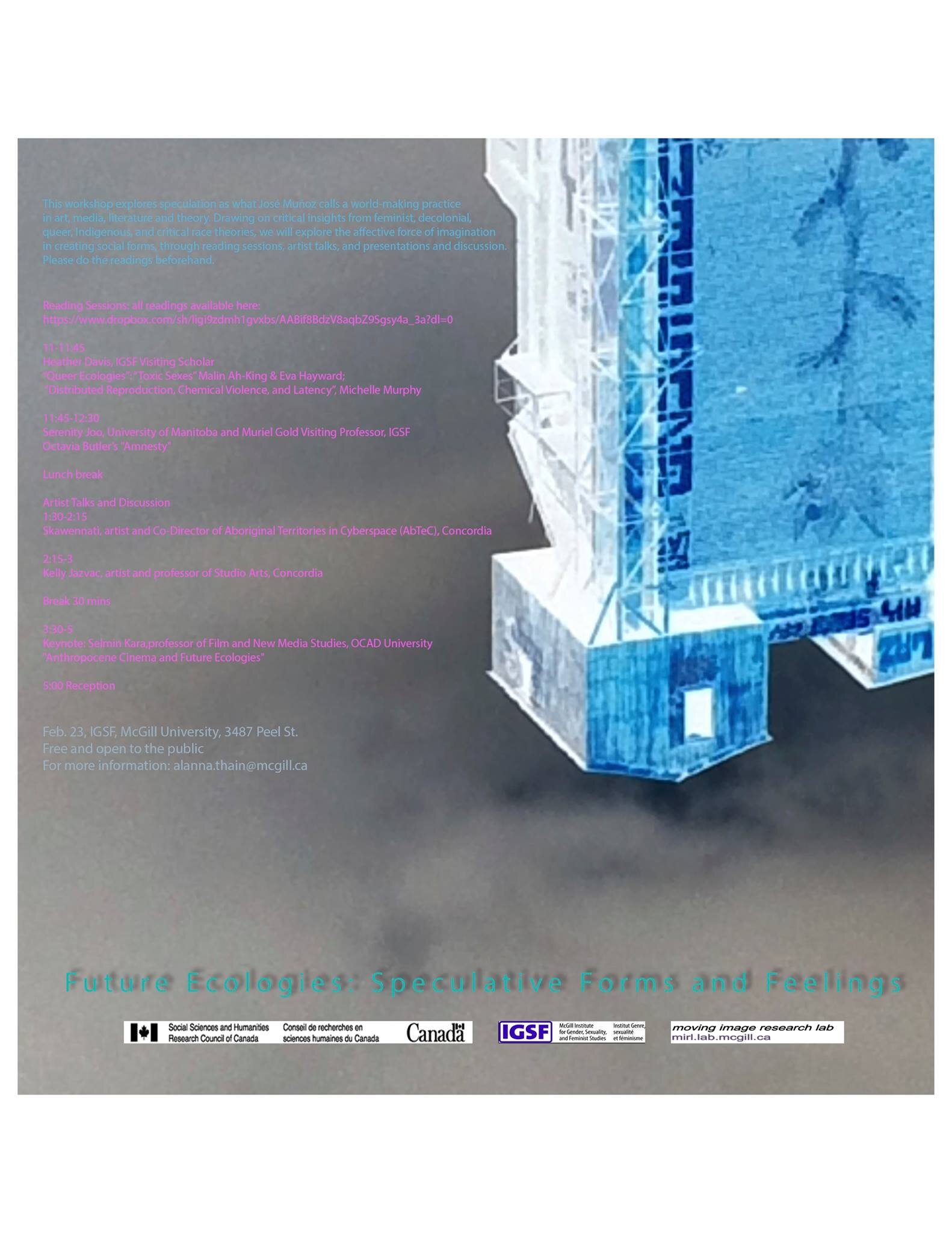
Future Ecologies: Speculative Forms and Feelings
This workshop explores speculation as what José Muñoz calls a world-making practice in art, media, literature and theory. Drawing on critical insights from feminist, decolonial, queer, Indigenous, and critical race theories, we will explore the affective force of imagination in creating social forms, through reading sessions, artist talks, and presentations and discussion. Please do the readings beforehand. Sponsored by the Institute for Gender, Sexuality and Feminist Studies, McGill; the Moving Image Research Lab; Social Sciences and Humanities Research Council.
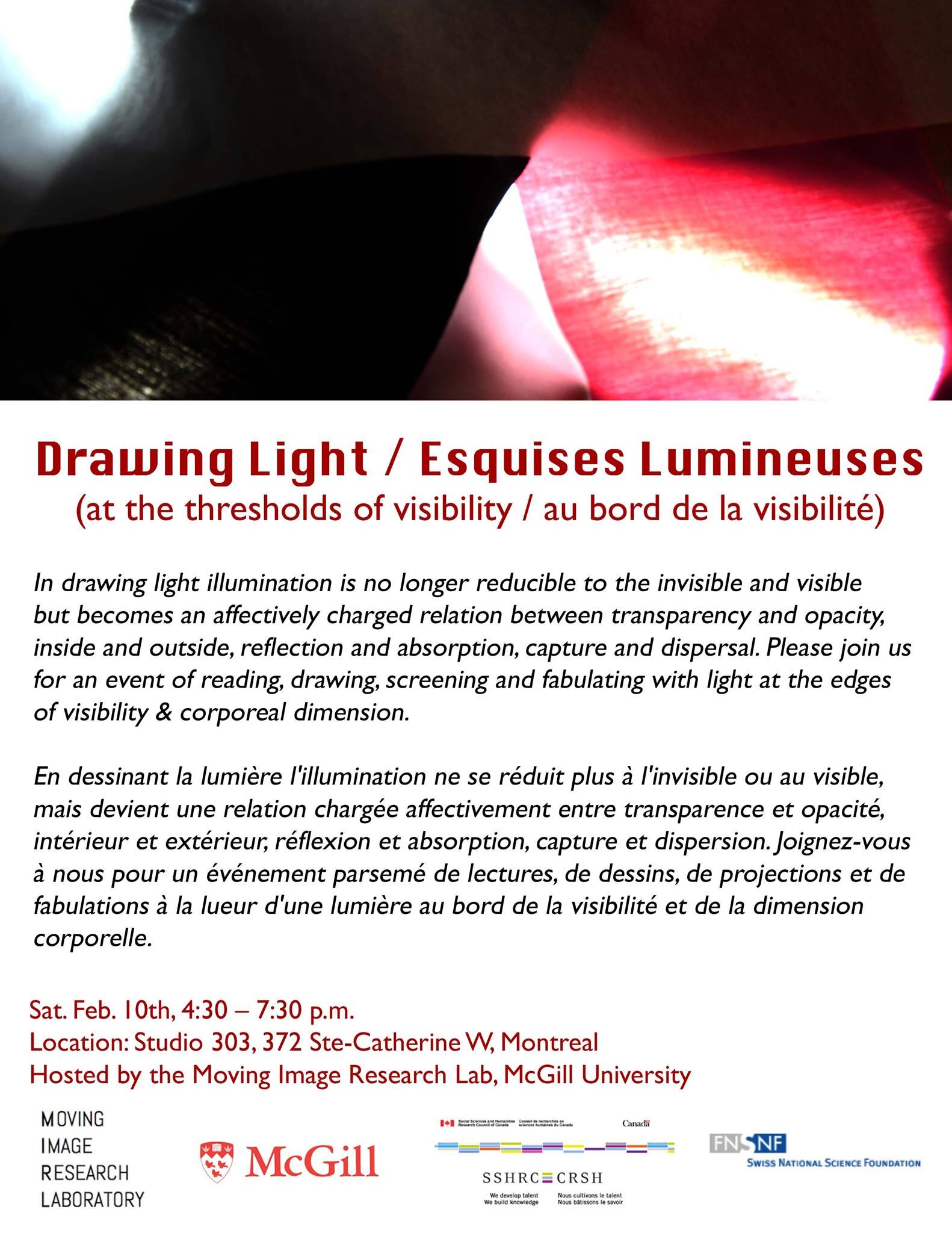
Drawing Light/Esquisses Lumineuses
A research-creation workshop with Nicole de Brabandere and the Moving Image Research Lab at Studio 303. …when illumination is no longer reducible to the invisible and the visible, but an affectively charged relation between transparency and opacity, inside and outside, reflection and absorption, capture and dispersaL. An event of reading, drawing, screening and fabulating with light at the edge of visibility and corporeal dimension.
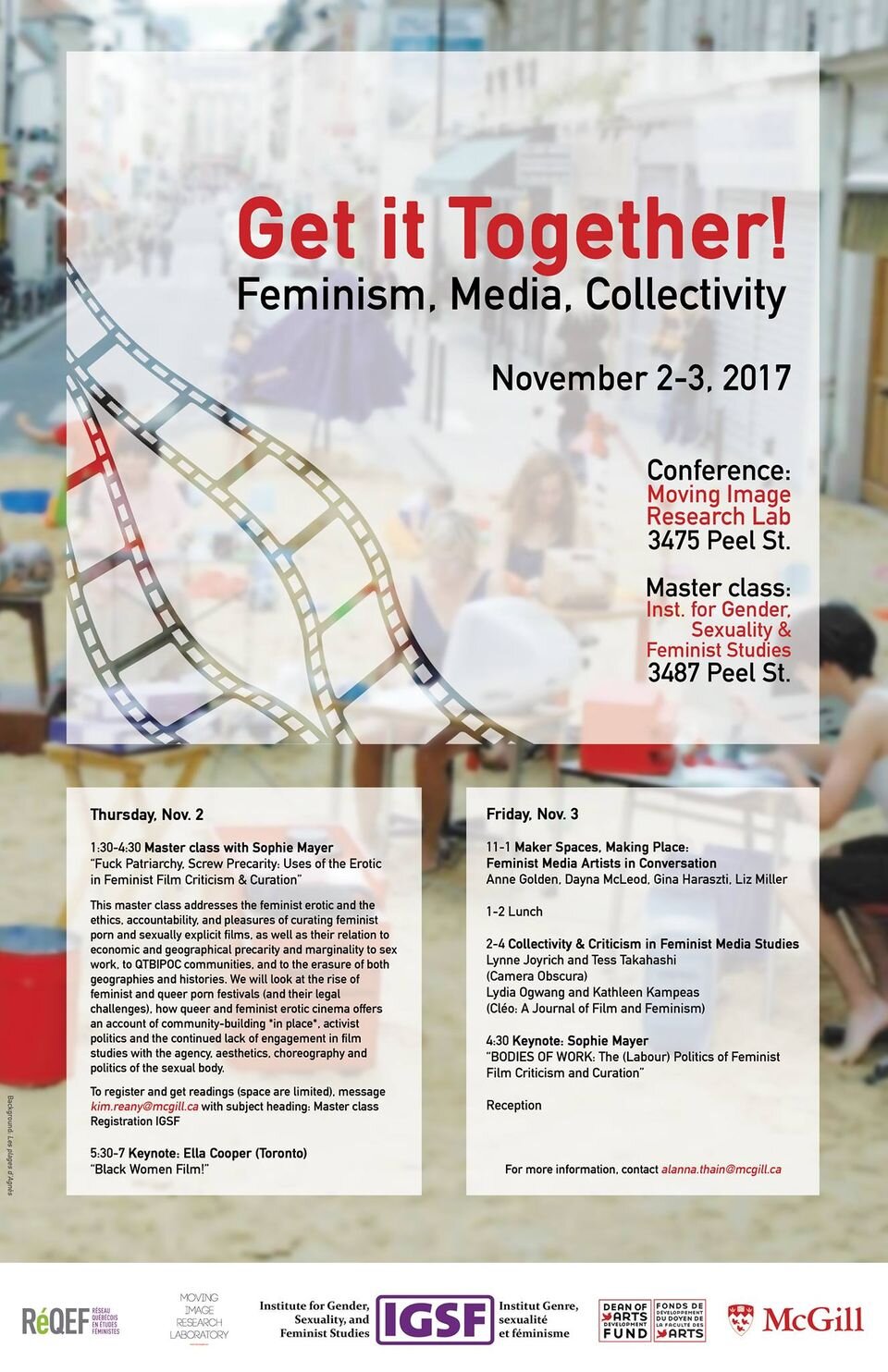
Get it Together! Feminism, Media, Collectivity
This two-day event considers feminism, media, and collectivity with a master class by Sophie Mayer, and conference with Ella Cooper, Anne Golden, Gina Hara, Lynne Joyrich, Kathleen Kampeas, Sophie Mayer, Liz Miller, Dayna McLeod, Lydia Ogwang, and Tess Takahashi. Master class with Sophie Mayer, “Fuck Patriarchy, Screw Precarity: Uses of the Erotic in Feminist Film Criticism & Curation," addresses the feminist erotic and the ethics, accountability, and pleasures of curating feminist porn and sexually explicit films, as well as their relation to economic and geographical precarity and marginality to sex work, to QTBIPOC communities,and to the erasure of both geographies and histories. Keynote by Ella Cooper, "Reclaiming the Black Female Body : Embodied Inquiry & Social Change."
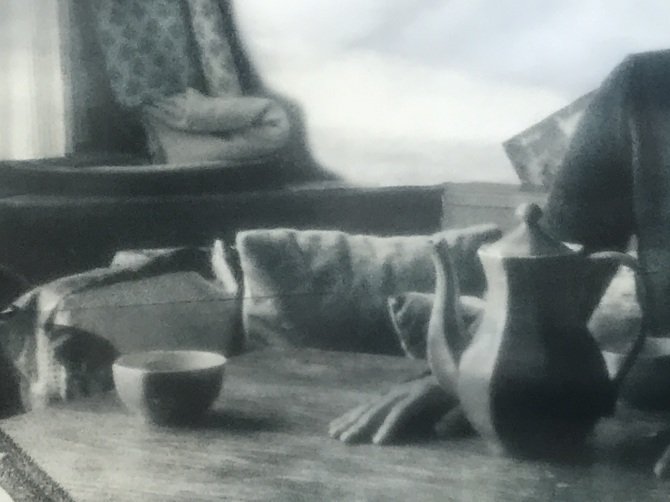
“Unstable Equilibrium” in Women’s Filmmaking: Florence Freitag on Maya Deren
Florence Freitag (www.florencefreitag.com) is a Berlin based french-german interdisciplinary media and performance artist. Her work moves between collaborative processes in the role of performer, videoartist/documentarist, writer, director or curator. In 2017/2018 part of her artistic and curatorial focus is on her muse and constant inspirational companion Maya Deren. Currently developing a dance performance around Deren’s work, Freitag will take a research-creation approach to Deren’s work, in dialogue with experimental women’s filmmaking inspired by choreographic questions and movement possibilities. In dialogue with Deren’s films and a selection of feminist experimental works, Freitag will trace an “unstable equilibrium”, linked to what she sees as Deren’s “bodily way of filmmaking” as a creative philosophy. Films to be screened in 16mm include: Maya Deren: Meshes of the Afternoon (1943), At Land (1944), A Study in Choreography for Camera (1945), Meditation on Violence (1948); Amy Greenfield: Element (1973), Shirley Clark: Bridges-Go-Round (1958) and Tanya Syed: Delilah (1995).
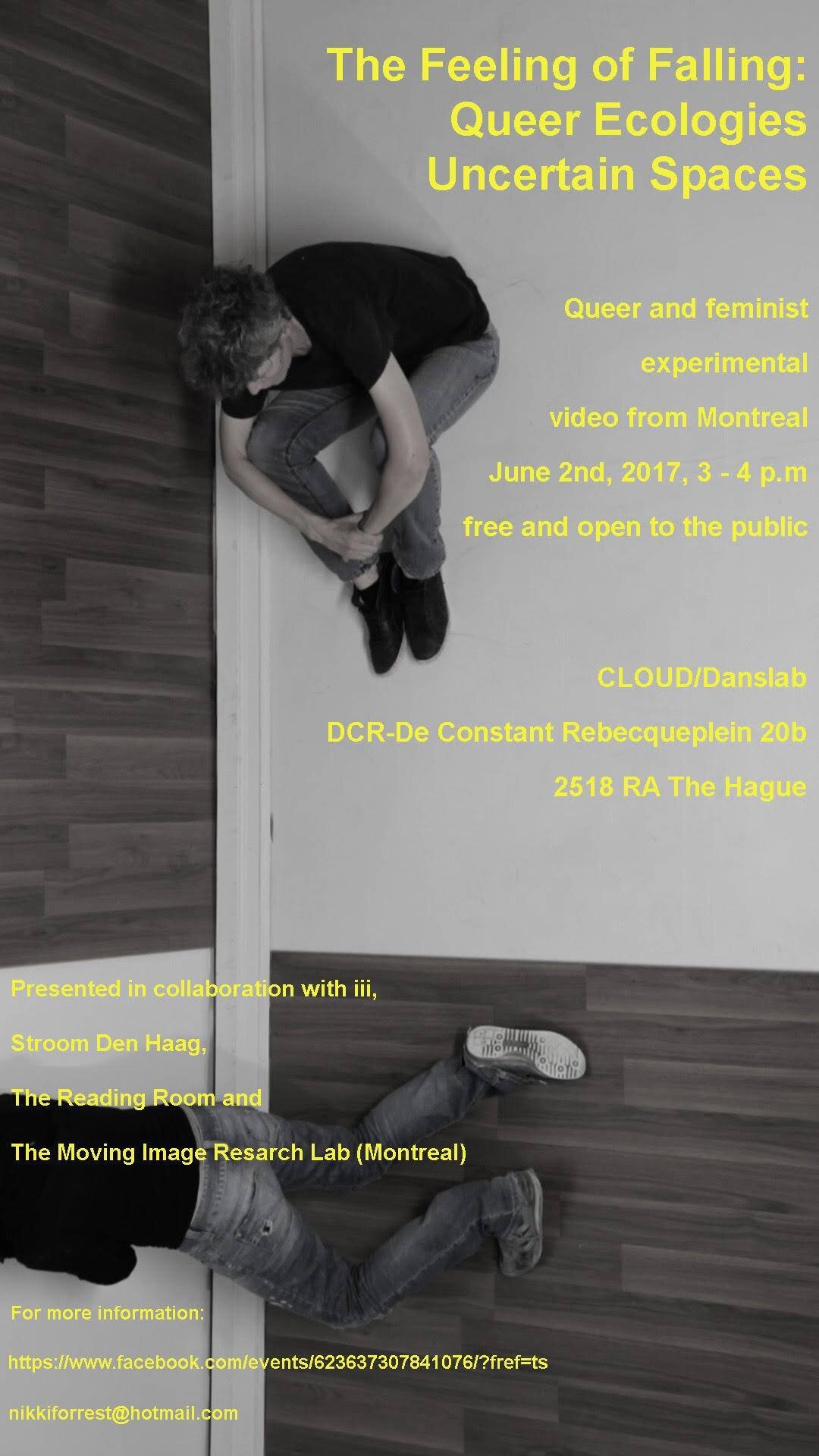
The Feeling of Falling: Queer Ecologies, Uncertain Spaces
Film Screening - The Feeling of Falling - Queer Ecologies, Uncertain Spaces in the Hague, Netherlands. Nikki Forrest, a Montreal based artist and curator, will present a one-hour experimental video program of recent short works from the independent artist run centres Groupe Intervention Video and Videographe based in Montreal. The program will explore intersections of movement practice, audiovisual media and environmental relations. The works are connected by a playful focus on Queer Ecologies, drawing out on alternative and marginal histories of media form and practice, including the critical importance of intersectional identities, sustainable support, DIY and micro-budget production and other material practices. In collaboration with iii and The Reading Room, and Christoph Brunner, Alanna Thain, Nikki Forrest, Sissel Marie Tonn and Jonathan Reus Brodsky.
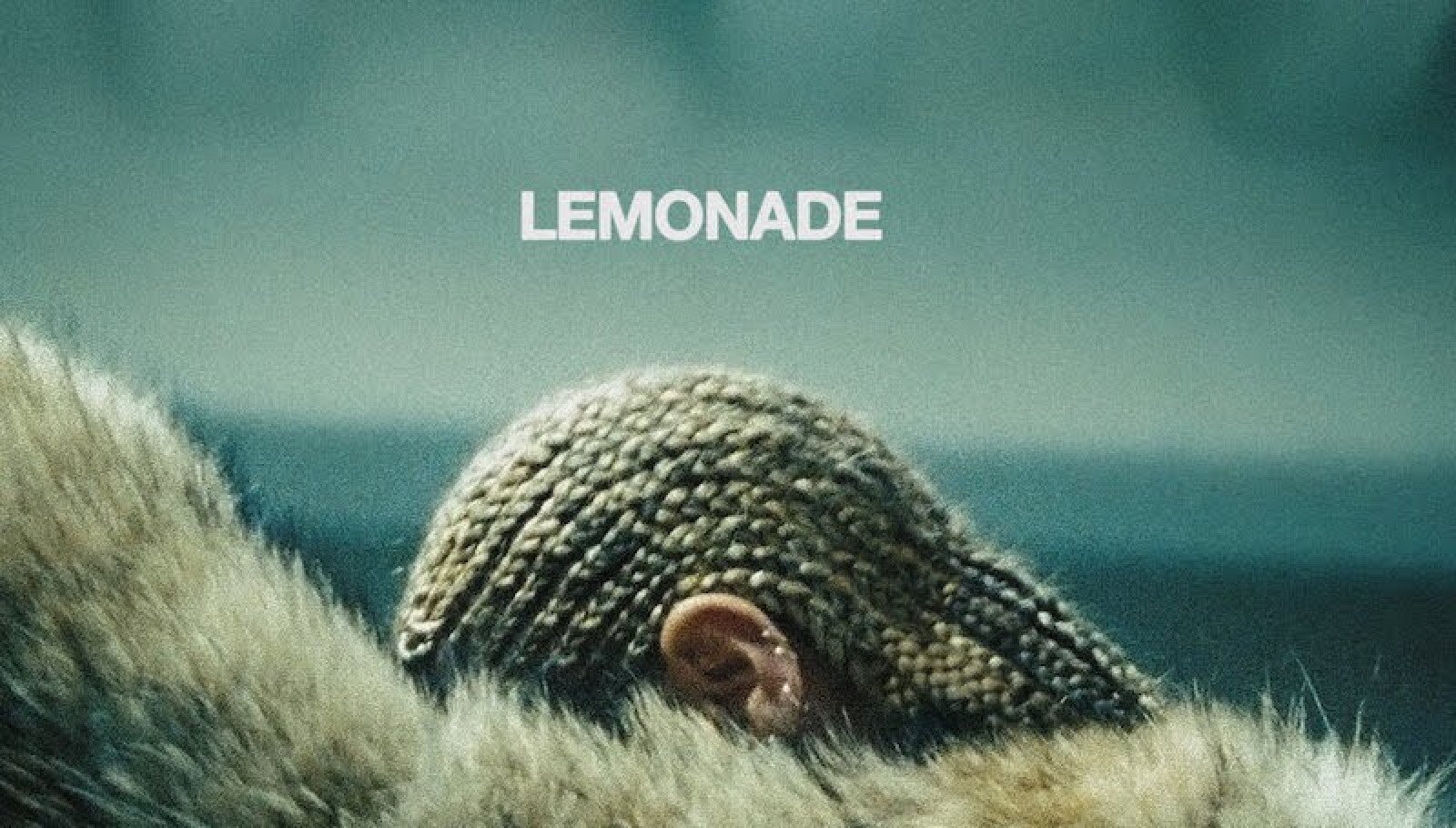
How Does it Feel to Be a Problem? Black Cultural Production and the Counter-Poetics of Rhythm in Beyoncé’s Lemonade (2016)
Guest lecture by Ayanna Dozier on April 11, 2017, 4-6pm (public access) at University of Amsterdam
Beyoncé’s Lemonade (2016) uses the rich diasporic pool of Black cultural production to signify liberation, as a “self-making” act, through resistant performance in the audiovisual form. This master class and talk will analyze the staging, performance, and use of Black cultural production made in Lemonade as a pedagogical tool for resisting colonial spaces and domination. Black cultural production signifies the practice of making culture that collectively speaks to spaces, subjects, and experiences that are racialized as Black. In this context, Blackness signifies “the discursive work—cultural practices, social meanings, and cultural identifications—that black people use to negotiate and construct meaningful lives” (Gray, Cultural Moves 2005, p. 19). Black cultural production’s use of performance pushes objects and subjects beyond the confines of representation or occupation of being a “thing.” Objects are things, and as cultural historian Robin Bernstein notes, “performance is what distinguishes an object from a thing” (Racial Innocence, 2011, p. 74). Performance for Black subjects has a history of being as a used signifier for the radical possibilities of freedom that exist outside of the occupation of colonization, which reduces racialized subjects to things.
The guest lecture will follow a master class that focuses on temporality and rhythm in the audiovisual form produced by Black individuals. Steering away from a linear history on the music video, this class will instead focus on the different temporal shifts and citations that make up such contemporary long-form musical videos like Lemonade. Additionally, the class will focus on how Black women – who Jacqueline Bobo cites as a specific class of cultural readers – produce and create emergent content that is politically informed and formally transgressive. The class’ focus on the theoretical conception of rhythm in the audiovisual form is a way of linking the histories, temporalities, and memories associated with Blackness that are mapped into the audiovisual form. Thus, the cultural citations that Beyoncé draws upon are specific to temporal shifts and memories that are overlooked and, at times, forgotten due to colonialism’s dominating sphere of erasure and subjugation of racialized individuals. Frantz Fanon writes rhythm as an affect that defines the “world of motion” set against the petrifying stillness of colonialism. This class will attempt to map out how rhythm is mobilized in Black cultural production but it does not suggest – nor claim – rhythm as an essentialist characteristic of Black existence. Rather, the class will seek to understand how a “world of motion” defines and speaks to the conditions of racialized embodiment, and how the negotiation of that concept finds its way into the audiovisual form.
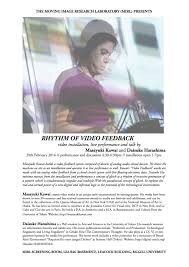
Rhythm of Video Feedback
The MIRL is pleased to present Rhythm of Video Feedback, a video installation, live performance, and talk taking place on Monday, February 29, 2015. Performance and talk/Q&A takes place from 4:30-6:30, with the installation open from 1 – 7 PM. Masayuki Kawai builds a video feedback system composed of dozens of analog audio-visual devices. He shows the machine on site as an installation and operates it as live performance as well.
Kawai’s “Video Feedback” works are made with an analog video feedback from a closed circuit system with free-flowing electronic data. No outer video/sound source is used; the video machines and circuits contain subtle noises that are amplified in the loop to generate infinite data flows. When these are put into the video input, they display various figure and colour mutations. When these are channeled into the audio input, they make sounds that are synchronized with the image. It is impossible to make these images and sounds by computer programming-simulation because the digital process eliminates the noise and gives privilege to the signals. Thus, through these works, we directly experience an organic creation of singularity with analog electronic video. Daisuke Harashima extracts from the installation and performance a concept of glitch as a rhythm of recursive generation of a pattern which is simultaneously singular and multiple. With the paradoxical concept of glitch, he explores the real and virtual power of a non-digital and in-formal logic as the potential of the technological environment.
Masayuki Kawai was born in 1972. He creates video works in a unique style that takes radical visions of philosophy and politics from the standpoint of the consideration and criticism of informational society and the essence of media. He explores his broad styles and activities unconstrained by existing genres such as films, contemporary arts, and media arts. His works have been shown in over 30 countries and has received numerous awards in media art festivals and exhibitions around the world. A collection of his works can be seen at the Queens Museum of Art in New York (U.S.) and at the National Museum of Art in Osaka (Japan). He was invited to as an artist in residence from the Jerusalem Center for Visual Arts, ISCP in NY, and Le Cube and Cite International des arts in Paris with support from the Jerusalem Foundation, Agency for Cultural Affairs of Japanese Government, POLA Art Foundation, Tokyo Wonder Site, City Government of Paris and Culturesfrance. To establish a critical role for video art in the society of spectacle, Kawai as a video artist, curator, and writer, directed a number of enlightening and challenging exhibitions and festivals and published an insightful book under the concept of “visual philosophy”. He holds a B.A. in aesthetics and M.A. in representation and culture from University of Tokyo.
Daisuke Harashima is a PhD student in Arts and Sciences at University of Tokyo. His research interests are information theories (from cybernetics and a mathematical theory or formal logic of communication, to second-order cybernetics, autopoiesis, transcendental empiricism, radical constructivism, fundamental informatics, neocybernetics, etc.) and media arts (focusing on the way they work out paradoxical ambiguities of freedoms and constraints, and self-producing sensors for singularities in present technological environment; collective activities; glitches and vibrations as sensuous continuums; verbal and virtual communications; ethico-aesthetic ecologies; improvisational morals of artificial and embodied intelligences; informal informations of insufficient reason and included middle). Among his publications are “Prediction and Production: Technological Singularity and Living Singularity.” in Gendai-Shiso (The Contemporary Thought)[Japanese] and “Close-and-Open: A Neocybernetic Approach to the Living System Condition in the Information Technological Environment.” Journal of Information and Media Studies [Japanese]. He also plays as a dj, vj or programmer/operator for media live performances. His recent work includes a video projection for a reenaction of Bernd Alois Zimmermann’s “Requiem für einen jungen Dichter” at Suntory Hall (Tokyo), and video projections and stage settings for live performances of scscs (Nagoya and Tokyo) and number0.
Ici sans espace qui est toute la danse II: Conversations on Contemporary Choreography in Montréal
For its second iteration, this public conversation draws on current situations to examine the ways in which dance creates, holds, and presses against a series of spaces – somatic, political, historical, epistemological, collective, filmic, written – to reimagine what choreography can do, as concept and practice, across the contemporary field. Thanks to Anarchival Outbursts and Immediations: Media, Art, Event, the Department of English at McGill University, and the MIRL.

